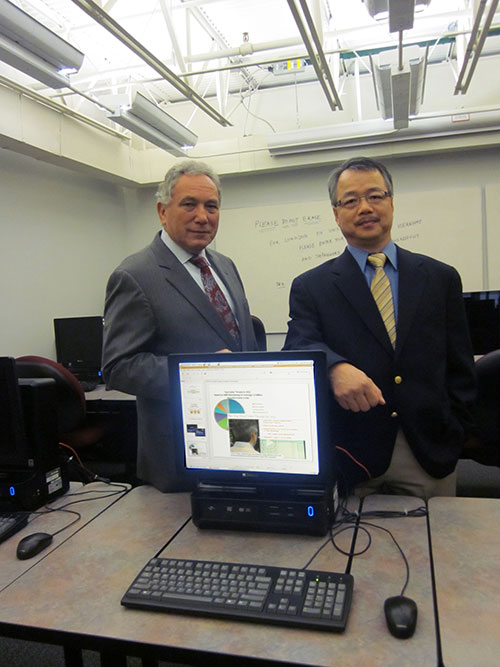UHCL announces addition of Cyber Security Institute

Karen Barbier
Contributing Writer
UHCL Office of Communications
Trojans, botnets and malware have integrated into every day vocabulary because of worldwide usage of the Internet, and University of Houston-Clear Lake will be doing its part to protect Internet users from the effects of such cyber threats through the creation of the Cyber Security Institute. The new institute is scheduled to open this spring and will include workshops and certification programs for local business owners, manufacturers, government employees, teachers, school administrators and non-profit organizations, as well as collaborative research projects with high-tech companies and other colleges and universities in the area.
“UH-Clear Lake’s faculty has worked closely with several local groups throughout the years in educational research activities related to cyber security,” says School of Science and Computer Engineering Dean Zbigniew Czajkiewicz.
Building on these past relationships, Czajkiewicz and Associate Professor of Computer Science and Computer Information Systems Andrew Yang, met with entities such as NASA Johnson Space Center and the Bay Area Houston Economic Partnership to create the center. The Cyber Security Institute will serve as a focal point of collaborations with area businesses and organizations in research and development, education and cyber security-related services.
“In addition to the traditional research and education functions, the UH-Clear Lake Cyber Security Institute will offer free and fee-based services to organizations and companies in the region, including public seminars for small business owners and summer camps for high school and college students,” says Yang, who will serve as executive director of the institute.
Yang earned his doctoral degree from University of Minnesota, Minneapolis, in Computer and Information Science. For the past 12 years, his research has focused on areas related to cyber security, including security of ad hoc networks, wireless sensor networks, wireless local area networks, and computer security education. In addition to teaching fundamental computer science courses at UH-Clear Lake, he has developed and taught new undergraduate and/or graduate courses in cyber security related areas, including Computer Security, Network Security, Web Security and Security of Wireless Sensor Networks.
Planned activities include cyber security workshops for business owners and managers, certification programs for professionals in the computing and networking fields, advanced cyber security test bed for research, and summer camps for high school students.
“In the future, we’d like to add a four-year degree in cyber security through the School of Science and Computer Engineering,” says Czajkiewicz adding that no other university in the area offers a degree in the field of study. “The degree would answer a need by local companies and organizations by providing prepared graduates to secure their company’s cyber systems.”
“The Houston region is among the most vulnerable regions in the country that are prime targets of cyber and other attacks. A successful attack will cause unimaginable disruption and damages to not only the city but also the nation’s and the world’s economy,” says Bay Area Houston Economic Partnership President Bob Mitchell. “The addition of a Cyber Security Institute at UH-Clear Lake could also capitalize on our highly skilled workforce in the region.”
The Ponemon Institute’s 2012 Cost of Cyber Crime Study: United States, a report sponsored by HP Enterprise Security, notes that cyber attacks have become common occurrences and that the 56 organizations in their study experienced 102 successful attacks per week or an average of 1.8 weekly attacks per company. The numbers represent an increase of 42 percent over a similar 2011 report, which reflected an average of 72 attacks per week. It also reinforces the cost effects of cyber crimes, with the average annualized cost for the benchmarked organizations at $8.9 million per year, up six percent over 2011.
“With support from nearby governmental agencies and organizations, we believe that the Cyber Security Institute can make a positive contribution to the cyber security landscape in the region,” adds Yang.
For more information about the university’s Cyber Security Institute, visit http://www.uhcl.edu/CyberSecurityInstitute or call Yang at 281-283-3835.
University of Houston-Clear Lake offers more than 80 undergraduate and graduate degree programs, including a doctoral program, from its four schools, which include the School of Business, School of Education, School of Human Sciences and Humanities, and School of Science and Computer Engineering. For more information about the university, visit http://www.uhcl.edu.

